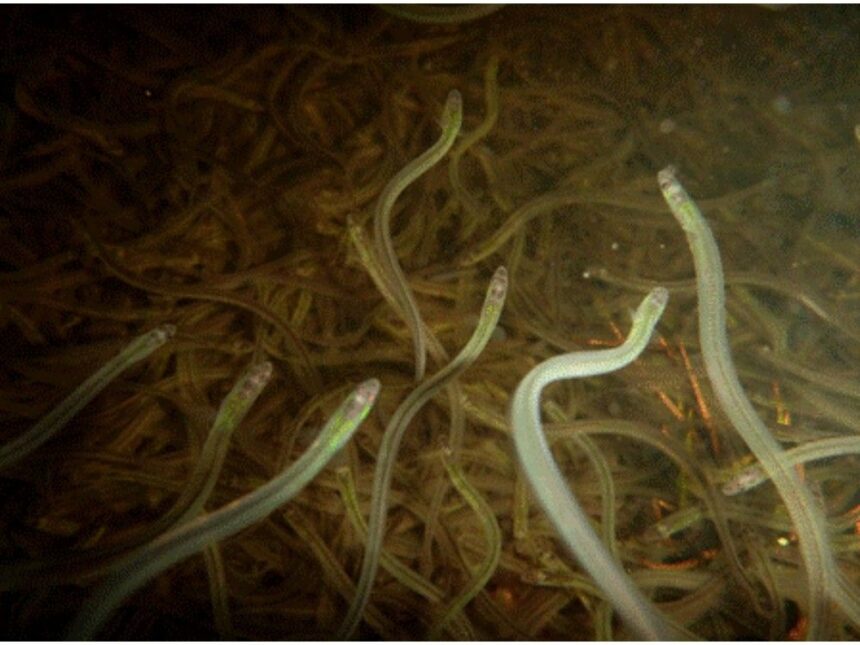Published Mar 30, 2025 • 3 minute readFisheries and Oceans Canada shut down the elver fishery in Nova Scotia and New Brunswick in 2023 to discourage conflicts that were becoming increasingly violent. Photo by ContributedElver fishing has become a hot topic within the Mi’kmaq communities and a moral debate. Alongside confusion regarding the stance of local chiefs on the situation, elver fishing has become a passionate topic online. Which is more important: honouring Treaty rights or protecting juvenile eels so they will be there for the next seven generations? Recommended from Editorial N.S. chief tells DFO it has no authority over Mi’kmaq, will pursue own elver fishery DFO unveils plan to bring peace to elver fishery as questions linger THIS CONTENT IS RESERVED FOR SUBSCRIBERS ONLY.Subscribe now to access this story and more:Unlimited access to the website and appExclusive access to premium content, newsletters and podcastsFull access to the e-Edition app, an electronic replica of the print edition that you can share, download and comment onEnjoy insights and behind-the-scenes analysis from our award-winning journalistsSupport local journalists and the next generation of journalistsSUBSCRIBE TO UNLOCK MORE ARTICLES.Subscribe or sign in to your account to continue your reading experience.Unlimited access to the website and appExclusive access to premium content, newsletters and podcastsFull access to the e-Edition app, an electronic replica of the print edition that you can share, download and comment onEnjoy insights and behind-the-scenes analysis from our award-winning journalistsSupport local journalists and the next generation of journalistsRegister to unlock more articles.Create an account or sign in to continue your reading experience.Access additional stories every monthShare your thoughts and join the conversation in our commenting communityGet email updates from your favourite authorsSign In or Create an AccountorArticle content‘THE L’NU CONCEPT OF NETUKULIMK’Membertou youth Noah Matthews-Cremo believes in the latter, sharing that his stance comes from growing up alongside elders and knowledge keepers. “Growing up in an L’nu community full of elders and knowledge keepers, the L’nu concept of Netukulimk was a value I learned at a young age, as most L’nu children would learn or at least used to,” said Matthews-Cremo. Noah Matthews-Cremo: “Growing up in an L’nu community full of elders and knowledge keepers, the L’nu concept of Netukulimk was a value I learned at a young age, as most L’nu children would learn or at least used to.” Photo by ContributedNetukulimk refers to a Mi’kmaq cultural concept that emphasizes the responsible use of natural resources for the well-being of the community and future generations. “It taught me that this land and its beautiful creatures on it provide us with all we need to survive and maintain a comfortable life, as long as we maintained a balance between what we need and not taking too much,” Matthews-Cremo explained. “In order to maintain an ecosystem, we knew we must give it time to grow and provide. This is why L’nu would never hunt a species’ baby, because we need to give it time to grow so that one day their baby’s baby can feed our children when they are fully grown.” ‘THE ACTS OF ASSIMILATION’Article contentMatthews-Cremo shared that he feels the shift is due to the long-term effects of residential schools and assimilation causing Mi’kmaq people to feed into greed and forget their values. “It seems to me that people are only thinking about right now and not the generations to come. I truly believe our ancestors would be baffled at this ideation as it stands against everything that has kept us alive for generations,” he said. “When these treaties were made, our people knew our values and knew we would never hunt a species into extinction. Unfortunately, it seems like the acts of assimilation have broken these deep-rooted values our people once had.” THE OTHER SIDEThe other side of the situation recognizes how the Department of Fisheries and Oceans’ plan to end the rampant poaching of elvers, by requiring fishers to hold a specific license, infringes on Mi’kmaq Treaty rights. Elver fishing has become a livelihood for many Mi’kmaq fishers, with several self-regulated elver fisheries existing outside of DFO’s framework, resulting in a murky situation. As the situation progressed, the Assembly of Nova Scotia Mi’kmaq Chiefs gathered to determine their stance on the issue and decide whether to accept the DFO’s offer which would allocate 50 per cent of the total allowable elver catch to First Nations. Article contentAll 13 chiefs decided to reject the offer. ‘SUSTAINABLE HARVESTING PRACTICES’In a statement from the Assembly of Nova Scotia Mi’kmaq Chiefs, co-lead of fisheries Chief Wilbert Marshall recognized the mixed feelings on the issue. “We are hearing both sides of the conversation and with community input have developed sustainable harvesting practices which are critical for preserving our connection to the eel for generations to come,” said Marshall. “Our harvesters are going through mandatory training for reporting catching and are committed to our collective sustainable goals. “Their ongoing cooperation will help us all to manage and utilize our rivers effectively while we work towards a conservation-based elver fishery.” Meghan Dewar is a Local Journalism Initiative reporter for the Cape Breton Post covering Indigenous Affairs.Article content
Debate ensues after chiefs reject DFO control of Mi’kmaq elver fishing











